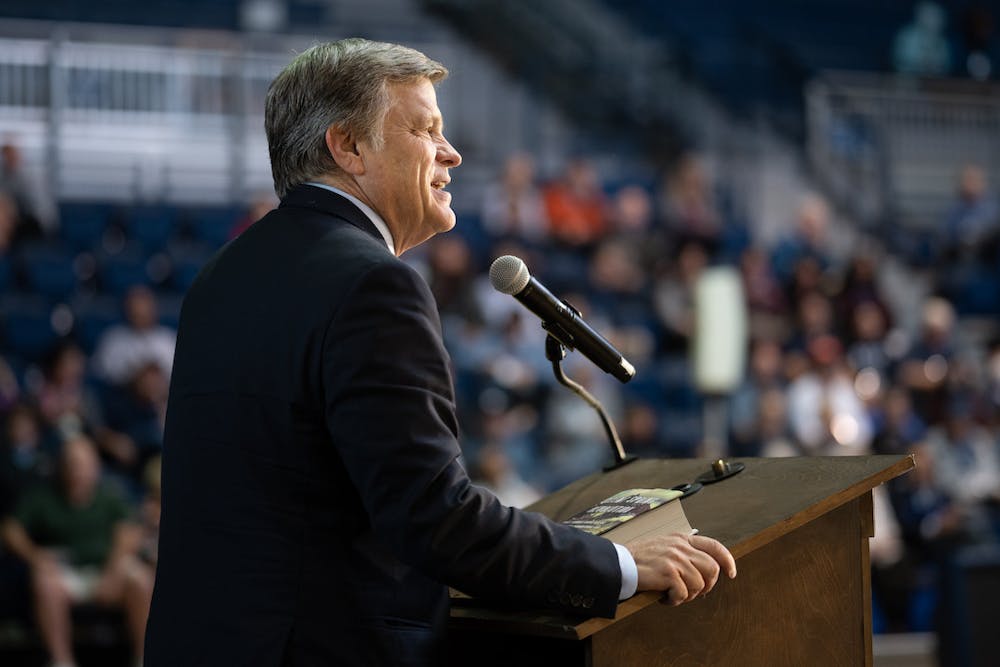Rice historian Douglas Brinkley on his Grammy nominations, musical community

In his free time, Douglas Brinkley, a history professor at Rice University, gets nominated for Grammy awards. This year, Brinkley has been nominated for two Grammys for co-producing “Black Men Are Precious” by Ethelbert Miller for Best Spoken Word Poetry Album and “Fandango At The Wall in New York” by Arturo O’ Farrill and the Afro-Latin Jazz Orchestra for Best Latin Jazz Album. Brinkley previously won a Grammy in 2017 for co-producing “Presidential Suite: Eight Variations on Freedom.” The Grammy Awards ceremony will be held on Feb. 5 in Los Angeles, broadcast live on CBS and streamed on Paramount+.
Though Brinkley, the Katherine Tsanoff Brown Chair in Humanities, is a historian first and has written books on U.S. presidents, foreign affairs and civil rights, music has always been a part of his life.
“My mom made me take piano lessons when I was a boy and it stuck,” Brinkley said. “And in my twenties, I’d like playing folk guitar and harmonica and dabbling with other instruments. At some point, instead of taking up golf or tennis or pickleball, like some people do. As I got older, I realized that I wanted to do more and more with my passion for music.”
Part of Brinkley’s inspiration to continue creating music can be credited to his musical community. He said that he began taking his work more seriously after becoming friends with people in New Orleans’ jazz world, such as Kabir Sehgal and Ellis and Wynton Marsalis.
“My real interest became working with Arturo O’Farrill,” Brinkley said. “We were very interested in thinking about the cross-pollination of American and Mexican music. We started looking at putting together a way to record ‘Fandango At The Wall.’ In fact, I went down with a bunch of musicians and we actually did an outdoor concert against the wall in Tijuana, Mexico.”
Brinkley considers music a creative outlet and said that he is naturally drawn to humanities.
“I’m much more about visual painting and photography and classical and jazz and pop music,” Brinkley said. “Sometimes when you have to do history writing, you have to stay so close to the facts that you become a little more about empirical data and so … music provides me with a way to let my creative spirit experiment.”
According to Brinkley, history is meant to be intentionally revisited and expanded upon, while music is a living force.
“I feel when I write history, I’m hoping years from now somebody will make a different statement and revisit one of my books,” Brinkley said. “Music projects, I feel like they’re a statement themselves that kind of lives in a very organic way.”
Brinkley said that one of his favorite parts of his musical journey has been seeing the unexpected interest in Arturo O’ Farrill’s work, especially younger audiences’ newfound interest in the jazz world.
“When I see that it’s an art form that’s very much alive, not just museumized, it makes me happy,” Brinkley said.
In the future, he hopes to continue exploring music styles from different countries. Brinkley said that he enjoys how other countries are experimenting with creating art through the intersection of poetry and jazz, and telling their folktales and traditions through their music.
“Every country has these great musical traditions, and it’s really fun to be an expeditionary and learn about new artists in different countries … I know the American scene pretty well, but getting to be a discoverer, it’s like traveling to a new country,” Brinkley said. “It’s exhilarating for me, because these artists … aren’t marquee names, but their musicianship is phenomenal.”
Though he loves writing, Brinkley said that he tries to make time for music as well by playing music with other musicians in his free time.
“I’m strangely having a lot of success in the music field right now,’ Brinkley said. “It’s about having a passion, and I’m doing it out of fun. But it has been rewarding to know that some people have noticed.”
More from The Rice Thresher

Rice welcomes 7.8% of applicants to class of 2029
Rice accepted 2,852 applicants to the class of 2029 March 26, said Yvonne Romero, vice president for enrollment. This represents 7.8% of 36,777, the highest acceptance rate since 2022.

Engineering school celebrates 50th anniversary, invites students, alumni and speakers
The George R. Brown School of Engineering invited engineering alumni, students and faculty to celebrate its 50th anniversary March 28-29. The event, which took place in the Engineering Quad, included speakers, a drone show, alumni gatherings and other social events like mixers.

ktru’s annual Outdoor Show moves indoors, still thrills
ktru’s 33rd annual “Outdoor Show” music festival shifted indoors March 29 due to concerns about inclement weather. Despite the last-minute location change, attendees, performers and organizers said the event retained its lively atmosphere and community spirit.

Please note All comments are eligible for publication by The Rice Thresher.